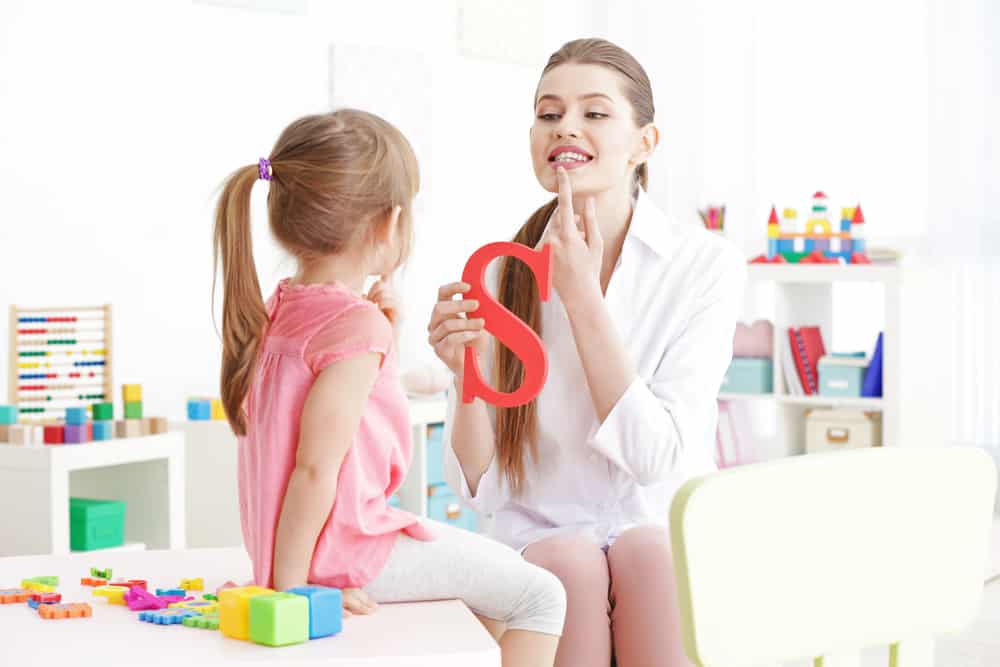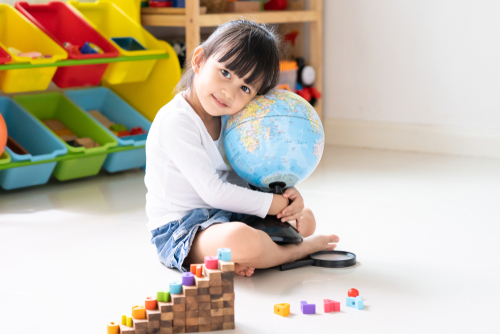Do Kids from Bilingual Families Start Talking Later?
In This Article
- Build Vocabulary with Your Bilingual Child
- My Experience with Bilingual Families as a Speech-Language Pathologist
- The Truth about Bilingual Kids
- D.G.’s Story: Working with a Bilingual Child on Speech Development
- D.G.’s Story Explained
- A Study’s Perspective on Bilingual Families
- The Key Take-away for Bilingual Families
Bilingual families are not so uncommon these days, and many parents reach out to us with a similar question: “My child is learning two different languages, does that mean he/she will fall behind his/her peers in school and have speech and language issues?”
I wish I could give you a straight-forward “yes” or “no” answer, but the truth is, I cannot. I can speak to you as a clinician who has seen many families who speak two different languages (e.g. Arabic and English, Spanish and English, and Hebrew and English). I can also provide you with some research on this very topic. Unfortunately, even though there are SOME studies, they range in consistency and don’t really make that many long-term conclusions.
One thing is for certain, recent studies have concluded that learning two languages can certainly lead to advantages for children. These include higher educational achievement, improved social use of language, and higher cognitive flexibility (being able to multitask). These benefits are most likely due to the high demand on their intellectual system because they manage two languages on a daily basis.
Build Vocabulary with Your Bilingual Child
Speech Blubs is a fantastic speech therapy app with more than 1,500 activities, face filters, voice-activated activities, and educational bonus videos. Explore activities to learn numbers, colors, shapes, animals, and watch your child learn right away! ❤️
Boost Your Child’s Speech Development!
Improve language & communication skills with fun learning!

My Experience with Bilingual Families as a Speech-Language Pathologist
One thing is for sure – I advise most families to limit their children’s language exposure to only one. So, if a family only speaks their dominant language at home but the child speaks a second language in a different setting (e.g. the family speaks Spanish at home, but the child goes to an English language school), then the family is forced to switch from their comfortable primary language and the one they model correctly to a language that is not easy to learn overnight. This causes confusion for the child AND the family. If that is what you are being advised to do, please do not listen and get a new therapist! Language development can be normal or abnormal REGARDLESS of how many languages the child is learning!

The Truth about Bilingual Kids
Bilingual children are also NOT more prone to developing a speech and language disorder. Odds are, if a child has a true language disorder, you will see the same articulation and sound errors in BOTH languages. This is why testing/evaluations should be conducted in both languages, if possible. If this cannot occur, the parent should be included in the room if the examiner has any questions about vocabulary. If therapy is provided in both languages, it leads to quicker progress and increased carryover to the second language.
In my practice, bilingual children, although at a slower rate, will show progress and develop normal speech and language skills with the help of therapy. Another thing to remember, every child is different. Even though they can learn vocabulary in multiple languages, if they have cognitive and learning disabilities they may develop slower than other children.
D.G.’s Story: Working with a Bilingual Child on Speech Development
I work full-time in a school district and part-time at a private practice. Both settings give me access to bilingual students (mainly Arabic and Spanish speaking).
One of the first little boys that I saw was a 6-year-old boy “D.G.” whose parents spoke Arabic at home. It is important to mention that his parents did know English, but preferred to speak only Arabic when the family was together. The little boy went to an English language only school. His parents brought him in for an evaluation because the staff at the school couldn’t understand him when he communicated. His parents also stated it was becoming difficult at home to comprehend his speech in English only.
When I first met “D.G.,” I noticed that I could only understand about 10% of what he was saying. This is extremely low for a child that is 6 years of age. He also seemed to have extreme difficulty paying attention to anything for more than 3-5 minutes. I cannot speak Arabic, but as part of my evaluation, I wanted to see what he was producing in both languages. His parents came into the room and I asked him to produce simple words like “dog” in both languages. According to his parents, he spoke words in Arabic, previously spoken clearly, in a distorted way; he also spoke in a distorted way in English, however, the English words were coming out clearer than the Arabic words.

D.G.’s Story Explained
I determined that “D.G.’s” English was improving (although unclear) and his Arabic was declining because heard English for more hours in the day than he heard Arabic. I told the parents to begin supplementing all Arabic communication with English. For example, if he requested “milk” in English, they should give him the word in Arabic and visa versa. After one year of therapy (twice a week), we noticed his significant improvement in both languages. So much so, that his intelligibility was at 75-85% in therapy.
“D.G.” also made progress in therapy because of his parents’ serious involvement and inquisitiveness about their roles. They constantly asked for handouts, suggestions and gave me feedback from “D’s” teachers. That will be key in your child’s success, as well.
A Study’s Perspective on Bilingual Families
Barbara Zurer Pearson (University of Miami) and Sylvia C. Fernandez (University of Maryland) published a study in 2001 looking at the patterns of vocabulary growth in bilingual infants and toddlers. They took 20 children from birth and followed them over a period of two years to see how their language developed. The study was very long and very involved, but they concluded several different things:
- Language development in two languages for one individual can be quite different, but have some similarities. What does that mean? Basically, every child is different, but bilingual children, in general, learned slightly slower in regards to vocabulary.
- Children who learned two languages from two different people, in two different settings were more successful in learning language. If you and your spouse are fluent in two languages, expose your child to both of those languages. If someone at their school or daycare is bilingual, try and have that person talk to your child when they are away from you.
The Key Take-away for Bilingual Families
Bilingual children are not behind in their speech development compared to monolingual children; they are just learning at a slower rate.
Read more about how to teach language through play!
